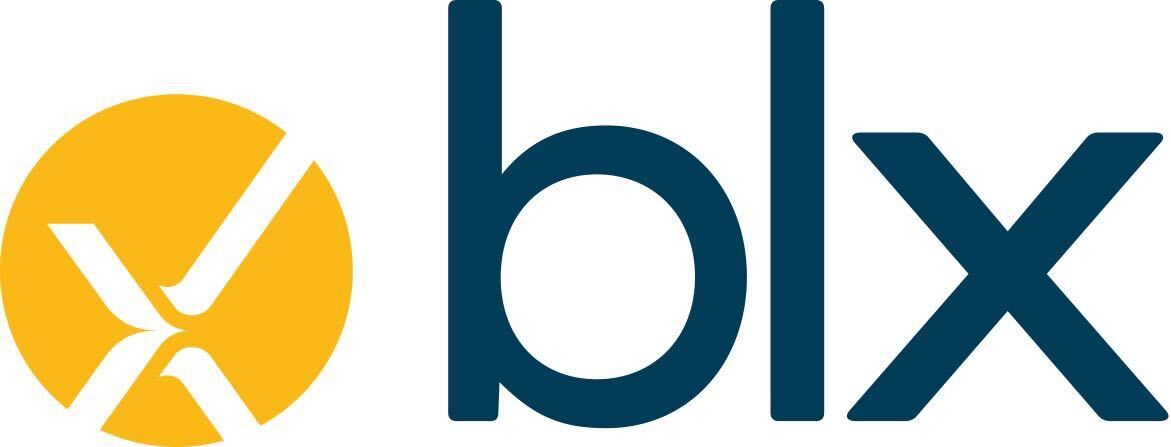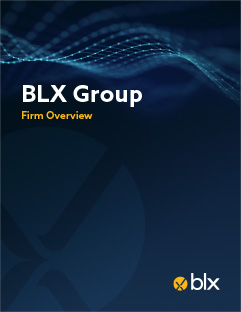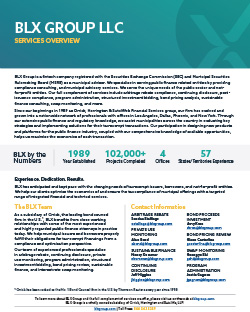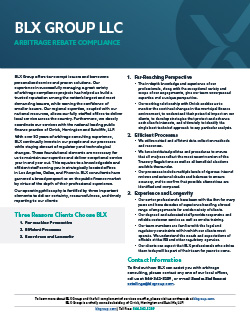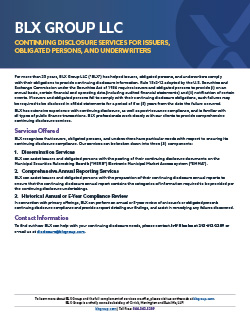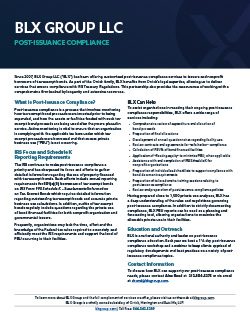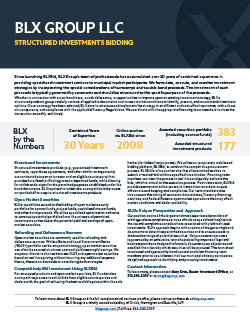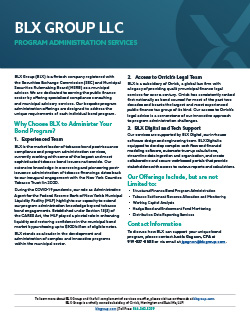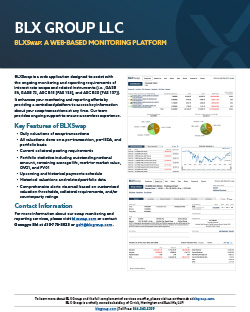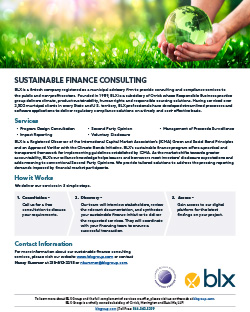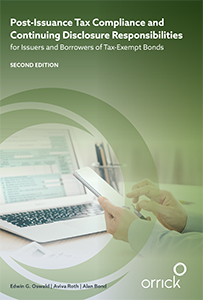
2024 PIC Workshop Agenda
- Day 1
- Day 2
| Day 1 | Thursday, November 21, 2024 | ||||
| START | SESSION | DURATION | SPEAKERS | ||
| 8:00 am | Registration/Breakfast (for in-person attendees) | 60 mins | |||
| 9:00 am |
Opening Remarks/Introduction | 5 mins
|
Alan Bond, BLX Jenna Magan, Orrick |
||
| 9:05 am |
Post-Issuance Compliance Overview | 30 mins
Post-Issuance Compliance (“PIC”) for tax-exempt bonds encompasses a wide variety of requirements and tasks over the life of the bonds that issuers and borrowers of tax-exempt bonds must comply with, including the investment and expenditure of bond proceeds, the use of bond financed facilities, and secondary market disclosures regarding the bonds. A robust PIC program is essential to maintaining the tax-exempt status of the bonds. This session will review the elements of a successful PIC program, discuss best practices and the benefits of an effective program, and provide participants with an introduction and baseline for the additional detailed discussions at the Workshop |
Alan Bond, BLX Richard Chirls, Orrick |
||
| 9:35 am |
Understanding PBU Rules and Exceptions | 50 mins
Issuers and borrowers of tax-exempt bonds are allowed a very small amount of private business use (“PBU”) in tax-exempt bond financed facilities. The federal tax rules and regulations relating to PBU are complex and require active monitoring over the life of the bonds. This session will provide a detailed overview of the rules and regulations relating to PBU (and unrelated trade or business use for 501(c)(3) organizations) and discuss what specific uses constitute qualified and nonqualified use. In addition, panelists will discuss the available exceptions to PBU, including short-term and incidental use. Understanding the relevant PBU rules and exceptions will help issuers and borrowers of tax-exempt bonds manage their tax-exempt financed facilities efficiently and potentially maximize revenue generating activities while maintaining compliance with the PBU restrictions. |
Amy Kron, BLX Ed Oswald, Orrick Larry Sobel, Orrick |
||
| 10:25 am | BREAK | 15 mins | |||
| 10:40 am |
MANAGEMENT AND SERVICE CONTRACTS: RULES AND MEASUREMENT METHODOLOGY | 60 min
Agreements with third party providers occurring in bond financed space may give rise to PBU depending on how such contracts are structured. In Rev Proc 2017-13, the IRS has provided guidance in the form of certain safe harbor requirements for contracts for services rendered in tax-exempt bond-financed facilities. While this revenue procedure can be helpful, organizations need to carefully navigate these principle-based concepts to help minimize the impact that noncompliant contracts may have on their PBU percentage. This session will provide an overview of the safe harbors that govern management and service contracts and discuss specific guidance for structuring contracts and agreements to be safe harbor compliant. In addition, this session will review the methodology for calculating PBU for management and service agreements utilizing specific examples relating to certain types of use. |
Richard Chirls, Orrick Caleb Lansky, BLX Aviva Roth, Orrick |
||
| 11:40 am |
SPONSORED RESEARCH: RULES AND MEASUREMENT METHODOLOGY | 50 mins
Increasingly, organizations are looking for ways to maximize revenue, recruit and retain faculty, and form relationships with the private sector, and sponsored research and related arrangements often are one of the options considered. Sponsored scientific research, research joint ventures and third-party access occurring in tax-exempt financed facilities may give rise to PBU depending on how rights to use intellectual property resulting from the research are managed. This session will discuss these arrangements, including the difference between basic and applied research and the IRS safe harbor rules relating to sponsored research as provided in Rev Proc 2007-47. As the trend continues for organizations to take on more sponsored research in their bond financed facilities, participants will be better equipped to make educated decisions regarding the use of such facilities in sponsored research endeavors and to structure agreements to be safe harbor compliant. |
Chas Cardall, Orrick Caleb Lansky, BLX Barbara Jane League, Orrick |
||
| 12:30 pm | LUNCH BREAK | 60 mins | |||
| 1:30 pm |
MARKET UPDATE AND OUTLOOK | 45 mins
The current high interest rate environment that we have been in for the last 2 years presents both opportunities and obstacles for organizations who borrow on a tax-exempt basis. While this interest rate environment is beneficial for the investment of bond proceeds there may be additional hurdles to getting tax-exempt financings to market. In addition, rising interest rates may cause a decrease in the market valuations for Reserve Fund investments which may trigger obligations to replenish such Reserves. This session will review recent debt issuance trends and discuss some of the current challenges around issuing debt as well as some of the benefits and other considerations to investing in today’s market. Panelists will also discuss the current reinvest market and provide specific examples of maximizing earnings on bond proceeds, along with specific steps that organizations can take to position themselves to take advantage of certain investment options. |
Amy Kron, BLX Sam Goldstein, RBC Capital Markets Raigen Padayachee, TD Bank Tom Tight, Public Trust Advisors |
||
| 2:15 pm |
AI AND MUNICIPAL BONDS | 40 min
AI is beginning to impact the municipal finance industry, with trading, pricing, credit, compliance, and disclosure all potentially affected. While inefficiencies in the market may be reduced through the use of AI, careful thought and review will need to be applied and tested with respect to its use. Our panelists will discuss ways in which a nonprofit health system, an investment bank, and a law firm are beginning to utilize AI in their businesses and operations. |
Josh Cain, BLX Steve Gilmore, Ascension Chris Good, RBC Capital Markets |
||
| 2:55 pm |
PBU: TOP 10 (POTENTIAL) MISTAKES | 30 mins
Because such a small amount of PBU is allowed within tax-exempt financed facilities, navigating the use of the facilities with respect to third party users can be difficult. Our panelists will discuss certain pitfalls and misconceptions regarding PBU and what constitutes qualified use, potential mistakes in calculating PBU, and how to mitigate existing PBU. Participants will be better equipped to avoid common stumbling blocks with respect to PBU and the use of their facilities. |
Alan Bond, BLX Ed Oswald, Orrick |
||
| 3:25 pm | BREAK | 15 mins | |||
| 3:40 pm |
ARBITRAGE REBATE COMPLIANCE: RULES, REGULATIONS, AND POSITIVE ARBITRAGE | 50 mins
After over 10 years of negative arbitrage, positive arbitrage is once again a reality for issuers and borrowers of tax-exempt debt. The rising and high interest rate environment that we have been in for the last 2 years brings with it the potential for positive arbitrage and having to make rebate or yield reduction payments. While there are certainly challenges in managing arbitrage rebate compliance in this environment, there are also opportunities for organizations to earn and potentially keep more or even all of their earnings on invested bond proceeds. Our panelists will discuss the rules and regulations relating to arbitrage rebate and yield restriction and offer strategies to maximize the retainable earnings in a positive arbitrage environment. |
Justin Gagnon, BLX Barbara Jane League, Orrick Sandee Stallings, BLX |
||
| 4:30 pm |
ARBITRAGE REBATE COMPLIANCE: CASE STUDIES | 30 mins
The arbitrage rebate and yield restriction rules can be challenging with nuances relating to their applicability. This session will review multiple case studies and provide real world examples illuminating key principles and best practices for applying the varied rules. Our examples will seek to make the regulations more relatable through a discussion of specific facts and circumstances. |
Justin Gagnon, BLX Sandee Stallings, BLX Aviva Roth, Orrick |
||
| 5:00 pm | COCKTAIL RECEPTION (for in-person attendees) | 120 mins | |||
